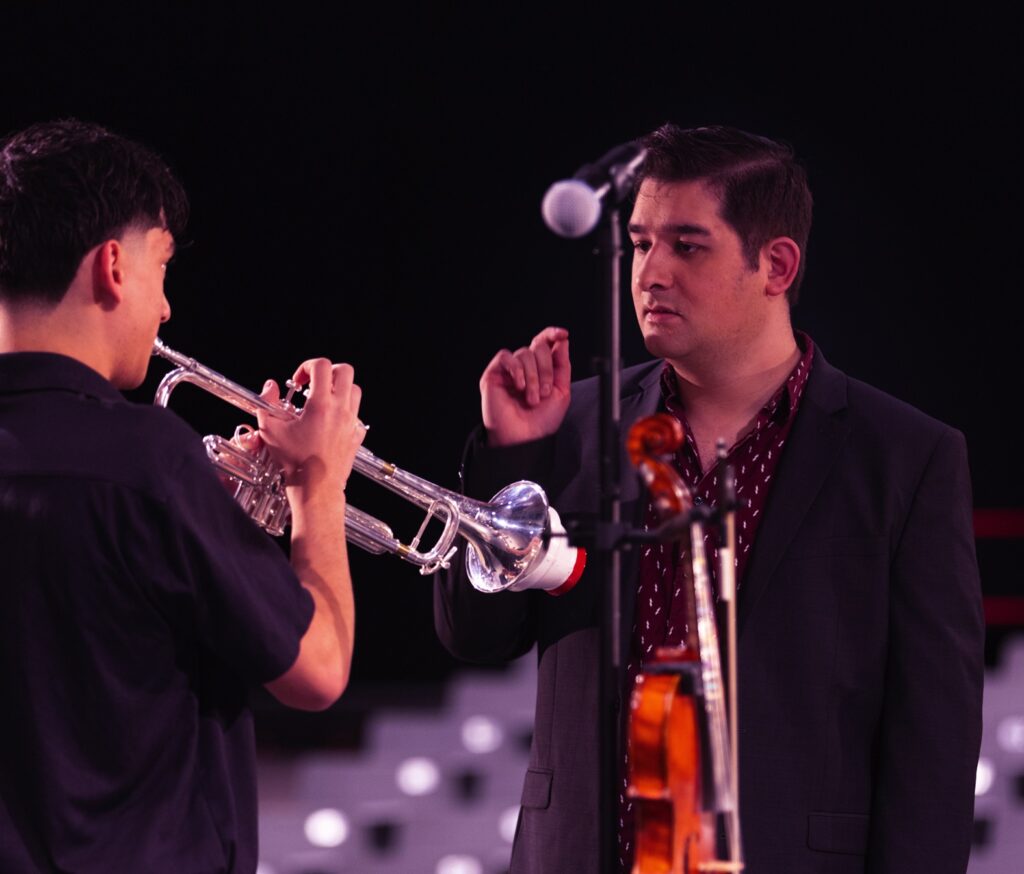Tagged Under:
How to Deal with Student Needs Beyond Music
Some days, you must be part parent, part counselor, part referee. Know when to report and when to just listen and be supportive.
It’s third period rehearsal. The flute section’s intonation is questionable, someone in the clarinet section forgot a reed, and your email is already full of messages with the subject line “Quick Ask!.” You’re halfway through warm-ups when one of your freshmen puts their instrument down and starts to quietly cry. You pull them aside, assuming it’s a bad grade or a friend fight. But it’s not that. They haven’t eaten since yesterday.
So, you do what any decent person would do: You dig out a granola bar from your desk drawer, offer it to them, and let them sit in the back to regroup. Meanwhile, you’re back on the podium trying to tune a chord while keeping one eye on the kid who just needed someone to care.
These are the moments that they don’t prep you for in teacher training. No one says, “Hey, you’ll be sight-reading chorales while also figuring out which students need food, which ones need to head to a cool-down room, and make sure these two kids don’t interact since they have a no-contact order.” You just end up doing it because you have to.
Sometimes, it’s not just one student. It’s three. Or five. Or more.
I’ve had days when I felt like I was running a conflict management workshop while pretending to run a rehearsal. This kid’s upset today, this one hasn’t slept, that one’s off their meds because the pharmacy is out — all while trying to decide if we should “take it again from the top!” Is this a rehearsal or a medical clinic?

You’re Not the Fixer. You’re the Constant.
If you’re teaching in a high-needs school, you’ve already figured this out: Your job is not just music. You’re going to end up being part parent, part social worker, part referee. Not because you want to, but because there’s often no one else. Remember, you can’t be everything. Trying to meet every student need with your own personal energy is a fast track to crashing hard and burning out.
I hate saying this, but sometimes we need to stay in our lane. We can be a supportive adult. We can care. But we’re not the parent, and if we really look around, we aren’t the only helper. This is hard for music teachers to accept, but there may be someone else in the building who is better equipped to work with students in crisis. And that’s OK because working in a community and letting everyone do their job will keep you from burning out.
You’ll have days when five different students need five different kinds of support, and you’ll feel like a terrible person for not having enough time or food for all of them. You’re not heartless. You’re just one person.
Kids may come up to you with huge issues -— things beyond needing food or dealing with a panic attack. It is OK to think, “I am not equipped for this.” Report it and pass this situation to someone with expertise or at least a little more experience so the kid gets the help they need.
Passing things isn’t a failure. It can often be the exact right thing to do. I know it’s hard to let go — especially for the band students you care about. Letting go doesn’t mean you stop caring. It means you’re still here tomorrow.
And for some of the minor things? Sure, it’s important to sweat the small stuff at times, but other times? Just let some things go unresolved. Not forever — just for today. That’s not neglect. That’s boundaries.
Build Systems That Don’t Drain You
You don’t need a new meditation program. You need a plan that doesn’t suck your soul. For my program, it’s a bin of personal care items in the uniform room that some of our band parents keep stocked. It’s nothing special — toothpaste, deodorant, some snacks. Students know it’s there, and they know they won’t get a lecture when they use it.
It took about two weeks of quiet use before someone asked, “Can I take more than one thing?” I told them, “Take what you need.”
That bin saves many kids from having many awkward conversations each year. The kind where students pretend they’re not dealing with basic needs because they don’t want to feel exposed.
I also lean on school resources. I regularly talk to our counselors, school psychologists, social workers, nurses — anyone whose job is better aligned with handling the bigger stuff. I’ve learned who to call, how to file reports and what situations I need to escalate.
That part took time. I made mistakes — I underreported or overreported. I sat on things too long because I wasn’t sure, but eventually, I learned.
And when a student just needs to sit and breathe? I let them sit. Not forever — just for a bit. No big production. No overexplaining. Sometimes a chair and a few quiet minutes are all that’s needed. Do some kids take advantage of this? Sure. But I adapt.

Know the Line Between “Noticing” and “Fixing”
When something is serious, you always refer. Abuse, mental health concerns, instability at home, pass it up the chain. Don’t sit on it. Refer immediately.
But not everything is a crisis. Sometimes a student just needs to know they’ve been seen and that they don’t have to put on a happy face all day. They need to know that someone in the building doesn’t think they’re a problem.
I’ve had students come in and say things like, “I don’t think I can do rehearsal today.” Not in crisis, but clearly not OK. So, I make sure someone from our student services team knows, but I also don’t skip the part where I check in directly. “I’m glad you said something. Let’s make sure you have the help you need.”
It’s easy to get numb, especially when it’s constant, but I try to notice anyway. Even if I don’t have time to solve it.
There’s an odd balance here, too, because once students know you’re a safe adult, they come to you more. That’s a good thing, but it can also feel like you’re the sponge soaking up everyone’s stress. So now I ask myself: “Is this something I can listen to, or is this something I need help with?”
In The Deep End
It’s easy to feel like you’re struggling when your classroom feels more like a clinic. When you’re switching from teaching to crisis response without even thinking about it. When students come to you with huge problems that don’t fit inside a school day.
It means you’re doing your job in a place where the needs are high and the support is thin.
Some days I go home thinking, “We didn’t really do as much rehearsal as I wanted.” Then, I remember that sometimes, what we did was hold it together for at least a few students.
It’s normal to feel tired and overwhelmed. It’s OK to protect your time, your energy, your prep period and your sanity. If you burn out, your students lose another consistent adult — and they don’t need one more person disappearing on them.
You’re not their parent, and you don’t need to be. You are, however, the one who notices when something’s off. You’re the one who keeps a snack or a spare deodorant stick handy. You’re the one who stays steady, even when the rest of their world is anything but.

















